"The Crying Need For Indian Foster Homes": Indigenous Women Challenge State Child Welfare Practices With Sarah Nickel, PhD.
March 12, 2024
Dr. Sarah Nickel
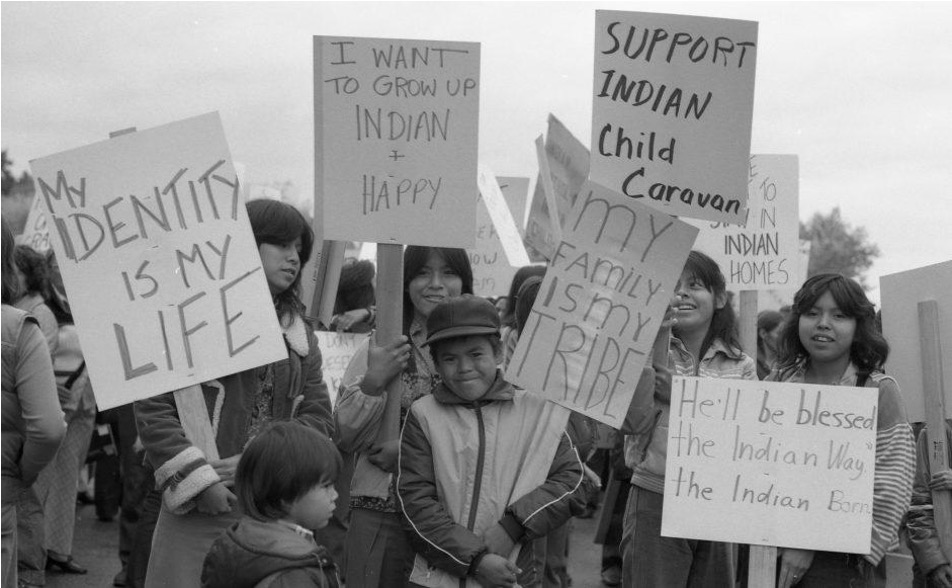
The Centre for Human Rights Research (CHRR) hosted a seminar titled “The crying need for Indian foster homes”: Indigenous Women Challenge State Child Welfare Practices with Dr. Sarah Nickel (UAlberta) on Tuesday, March 12, 2024, at 2:30 pm in 543-544 UMSU University Centre.
Sarah Nickel is Tk’emlúpsemc, French Canadian, and Ukrainian, and an associate professor of History at the University of Alberta. Her work focuses on twentieth century Indigenous politics and the gendered nature of political work drawing on community- engaged methodologies. Her first book, Assembling Unity: Indigenous Politics, Gender, and the Union of BC Indian Chiefs was published in 2019 with UBC Press and won the Canadian Historical Association’s prize for Best Book in Indigenous History in 2020. Sarah’s second monograph, Active Women: Indigenous Women’s Social and Political Work in Kanata’s West will be published with the University of Toronto Press in late 2024.
This seminar is a part of our annual Critical Conversations seminar series. This year, the seminar series focused on the CHRR’s research theme Reproductive and Bodily Justice and explored histories of the body, reproduction, and care in Canada and beyond.

Innocents Behind Bars: Systemic Racism and Wrongful Convictions
Innocents Behind Bars: Systemic Racism and Wrongful Convictions
November 28, 2023
Kara Sievewright
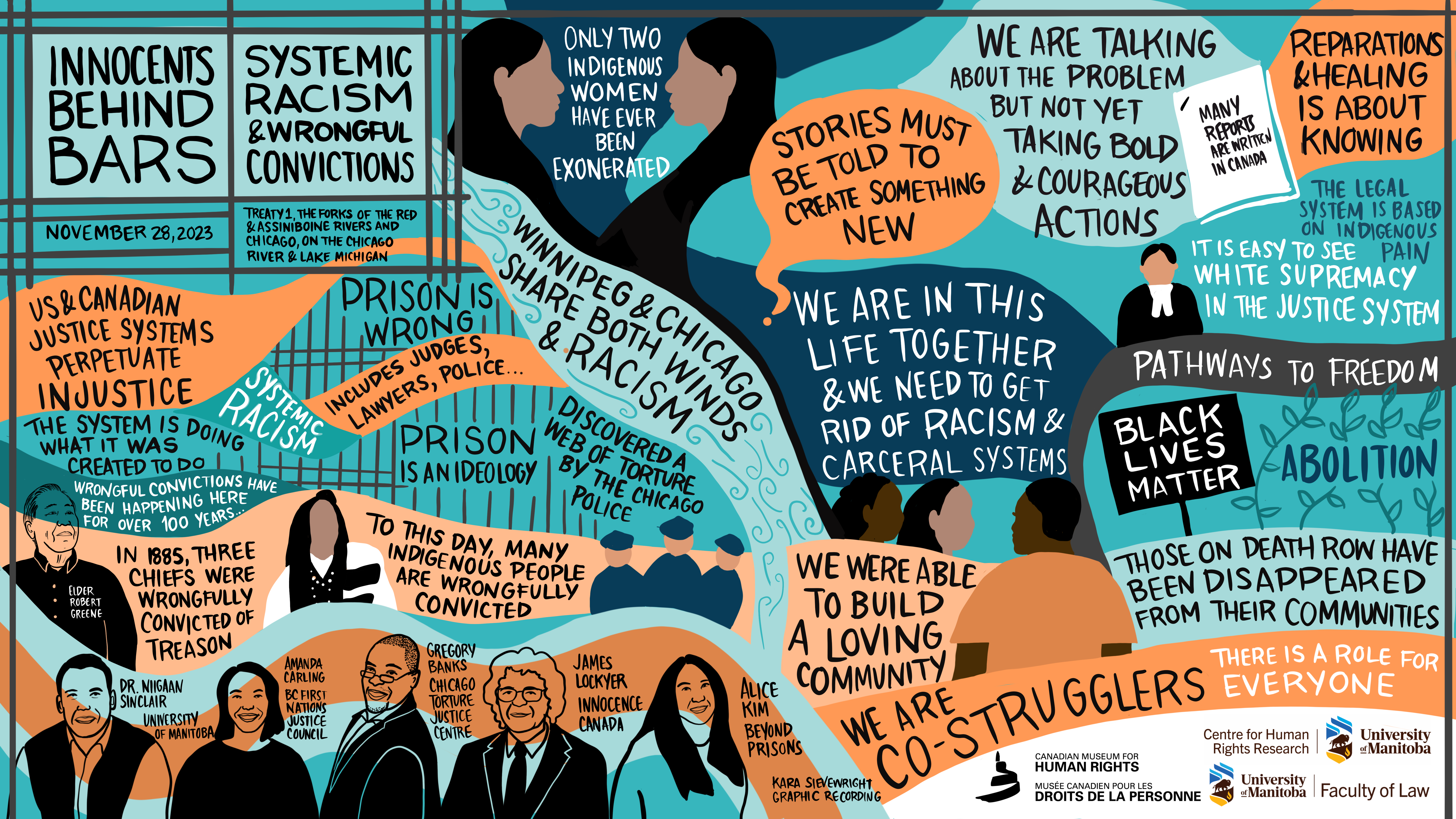
The Canadian Museum for Human Rights, the Centre for Human Rights Research (University of Manitoba), and the Faculty of Law (University of Manitoba) co-organized and sponsored a public event on November 28, 2023 “Innocents Behind Bars: Systemic Racism and Wrongful Convictions.” There were over 125 people in attendance, as well as 25 people joining online.
The panel brought together leaders of the police torture justice/reparations movement in Chicago, into conversation with those working on demanding justice for Indigenous and racialized peoples wrongly imprisoned here in Canada.This event is inspired by the July 2023 release of Allan Woodhouse and Brian Anderson who were wrongfully imprisoned for a murder they did not commit and spent almost fifty years fighting to clear their names. Brian Anderson and members of his family were in attendance and Allan Woodhouse was able to join virtually.
Artist Kara Sievewright, Maker of Nets captured highlights of the event with a graphic recording.
Related Resources
Support Us
Whether you are passionate about interdisciplinary human rights research, social justice programming, or student training and mentorship, the University of Manitoba offers opportunities to support the opportunities most important to you.
Innocents Behind Bars: Systemic Racism and Wrongful Convictions
Innocents Behind Bars: Systemic Racism and Wrongful Convictions
November 28, 2023
Amanda Carling, James Lockyer, Alice Kim, Gregory Banks, Niigaan Sinclair, Elder Robert Greene
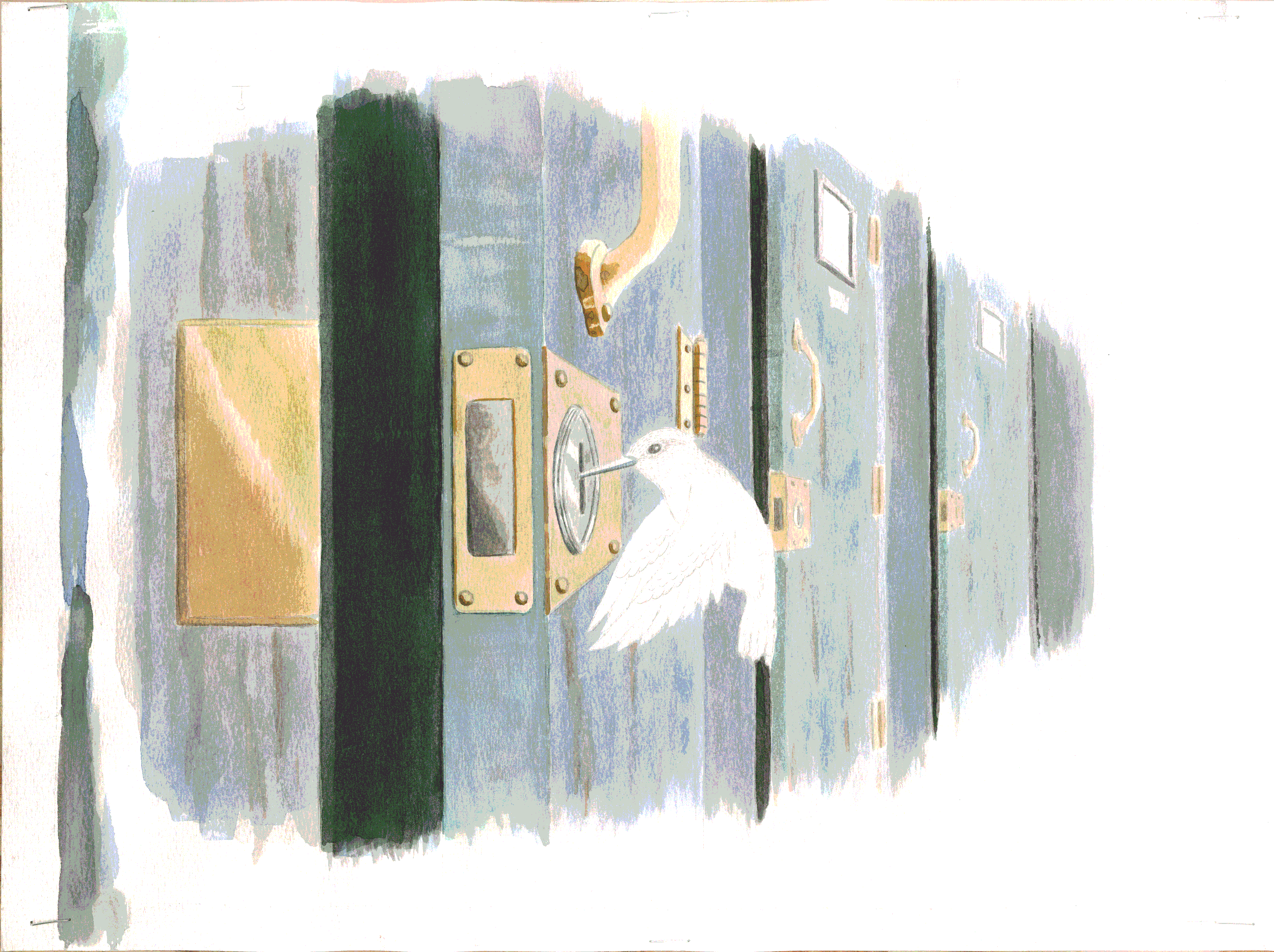
On November 28, 2023, the Canadian Museum for Human Rights, the Centre for Human Rights Research (University of Manitoba), and the Faculty of Law (University of Manitoba) co-organized and sponsored a public event “Innocents Behind Bars: Systemic Racism and Wrongful Convictions.”
We were honoured to welcome:
- Amanda Carling, CEO, BC First Nations Justice Council
- James Lockyer, Founding Director, Innocence Canada
- Alice Kim, Director of Human Rights Practice, Centre for the Study of Race, Politics and Culture
- Gregory Banks, Torture Survivor and Learning Fellow, Chicago Torture Justice Center (joining virtually)
- Facilitated by Dr. Niigaan Sinclair, Indigenous Studies, University of Manitoba
- Opening remarks from Elder Robert Greene, Canadian Museum for Human Rights

Wrongful Convictions and Systemic Racism: A Resource Guide
Wrongful Convictions and Systemic Racism: A Resource Guide
November 2023
Stephen Carney, Alana Conway, Carlie Kane, Dr. Pauline Tennent

A Resource Guide with links to resources related to wrongful convictions and the impact of systemic racism and discrimination on the justice systems in settler colonial contexts such as Canada, the United States, and other countries around the world.
Related Resources
Support Us
Whether you are passionate about interdisciplinary human rights research, social justice programming, or student training and mentorship, the University of Manitoba offers opportunities to support the opportunities most important to you.
Messy Ethics in Human Rights Work Book Launch
Messy Ethics in Human Rights Work Book Launch
October 26, 2023
Dr. Neil Bilotta, Dr. Christina Clark-Kazak, Dr. Maritza Felices-Luna, Dr.Shayna Plaut, Dr. Lara Rosenoff Gauvin.
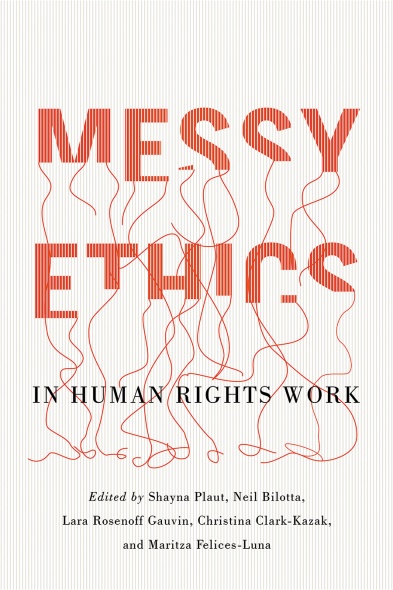
Every day, those doing human rights work are confronted with irresolvable ethical dilemmas that extend beyond institutional ethical processes. Messy Ethics in Human Rights Work invites readers into a series of overlapping conversations, as activists, researchers, artists, and others reflect on the complex disorderliness of ethics in practice, and the implications for human rights work. Contributors share situations when they were ethically stuck between a rock and hard place. What happened? What would they do differently next time? This work proposes that personal reflection and collective, sometimes uncomfortable discussion, are essential components of critical human rights practice.
On Thursday, October 26, 2023 at 7pm, in collaboration with McNally Robinson Grant Park and UBC Press, the Centre for Human Rights Research hosted a launch of the book with a conversation with the co-editors exploring what ethics means in the human rights work they do.
Related Resources
Support Us
Whether you are passionate about interdisciplinary human rights research, social justice programming, or student training and mentorship, the University of Manitoba offers opportunities to support the opportunities most important to you.
Islamophobia and Colonial Violence: Solidarity and Civil Resistance in Post-9/11 Manitoba
Islamophobia and Colonial Violence: Solidarity and Civil Resistance in Post-9/11 Manitoba
October 25, 2023
Dr. Youcef Soufi
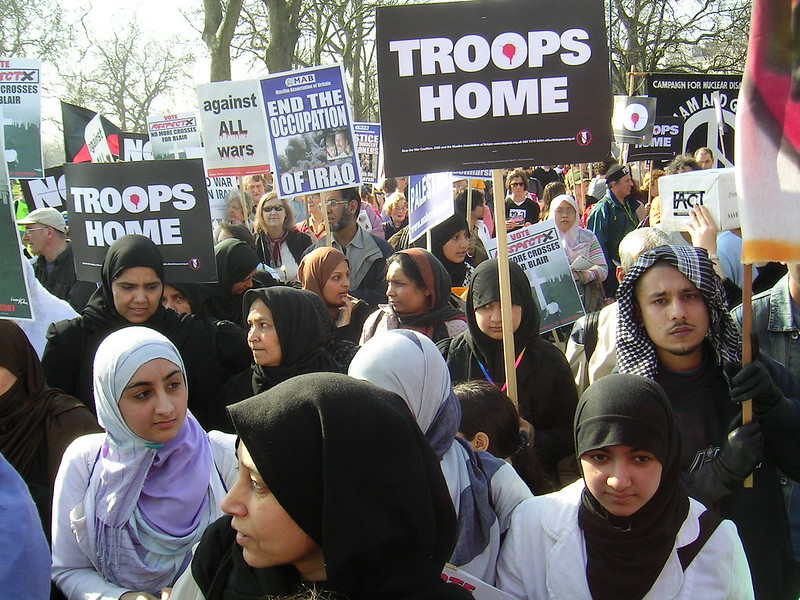
On October 25, 2023, the Centre for Human Rights Research (CHRR) hosted a seminar on the topic of islamophobia and colonial violence with Dr. Youcef Soufi from the Institute of Islamic Studies at the University of Toronto. The event focused on the experiences of solidarity and civil resistance of Muslim Canadians in the aftermath of 9/11 and during the US’s global war on terror.
Related Resources
Support Us
Whether you are passionate about interdisciplinary human rights research, social justice programming, or student training and mentorship, the University of Manitoba offers opportunities to support the opportunities most important to you.
Islamophobia and Colonial Violence: Solidarity and Civil Resistance in Post-9/11 Manitoba — A Resource Guide
Islamophobia and Colonial Violence: Solidarity and Civil Resistance in Post-9/11 Manitoba -- A Resource Guide
October 2023
Angela Gail Ciceron, Dr. Pauline Tennent, Dr. Youcef Soufi
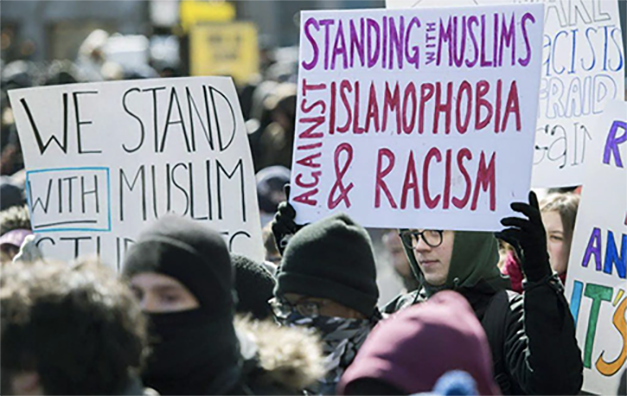
On October 25, 2023, the Centre for Human Rights Research (CHRR) hosted a seminar on the topic of islamophobia and colonial violence with Dr. Youcef Soufi from the Institute of Islamic Studies at the University of Toronto. The event focused on the experiences of solidarity and civil resistance of Muslim Canadians in the aftermath of 9/11 and during the US’s global war on terror. As an extension of the seminar, this resource guide provides further readings and media for participants who would like to deepen their understanding of islamophobia in the context of Canada.
Related Resources
Support Us
Whether you are passionate about interdisciplinary human rights research, social justice programming, or student training and mentorship, the University of Manitoba offers opportunities to support the opportunities most important to you.
She is Sacred: Reflections on the National Inquiry into MMIWG2S+
She is Sacred: Reflections on the National Inquiry into MMIWG2S+
October 6, 2023
Dr. Karine Duhamel, Dawn Chartrand
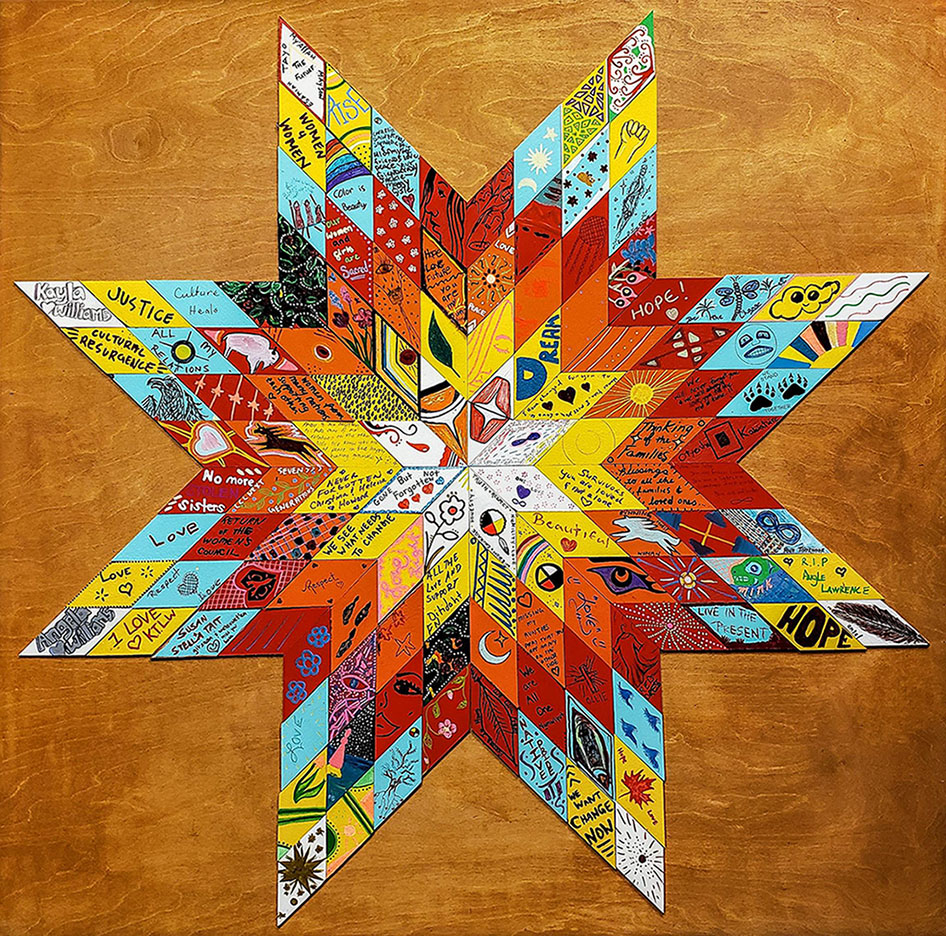
The content in this video may be difficult and/or triggering. If you or someone you know needs emotional assistance related to this topic or the information in this article, help is available 24/7 through the MMIWG Support Line, 1-866-413-6649.
On October 6, 2023, Indigenous Engagement and Communications and the Centre for Human Rights Research hosted “An Event in Honour of the National Day of Action on MMIWG2S+” with Dr. Karine Duhamel and Dawn Chartrand.
Dr. Karine Duhamel’s talk was entitled “She is Sacred: Reflections on the National Inquiry into Missing and Murdered Indigenous Women and Girls.”
Karine Duhamel is Anishinaabe-Métis and a member of Red Rock First Nation. She holds a Bachelor of Arts from Mount Allison University, a Bachelor of Education from Lakehead University and a Master’s degree and PhD in History from the University of Manitoba. From 2018 to 2019, she was Director of Research for the historic National Inquiry into Missing and Murdered Indigenous Women and Girls, drafting the Final Report, directing the Legacy Archive, and managing the Forensic Document Review Project. She is now Director of Indigenous Strategy for the Social Sciences and Humanities Research Council of Canada, working to implement the strategic plan focused on supporting Indigenous research and researchers.
Following Dr. Duhamel’s talk, we participated in a Laughing Yoga workshop with Dawn Chartrand.
Related Resources
Support Us
Whether you are passionate about interdisciplinary human rights research, social justice programming, or student training and mentorship, the University of Manitoba offers opportunities to support the opportunities most important to you.
Imagining the Peg as a Human Rights City
October 12
Centre for Human Rights Research, Centre for Social Sciences Research and Policy, Erica Bota, ThinkLink Graphics
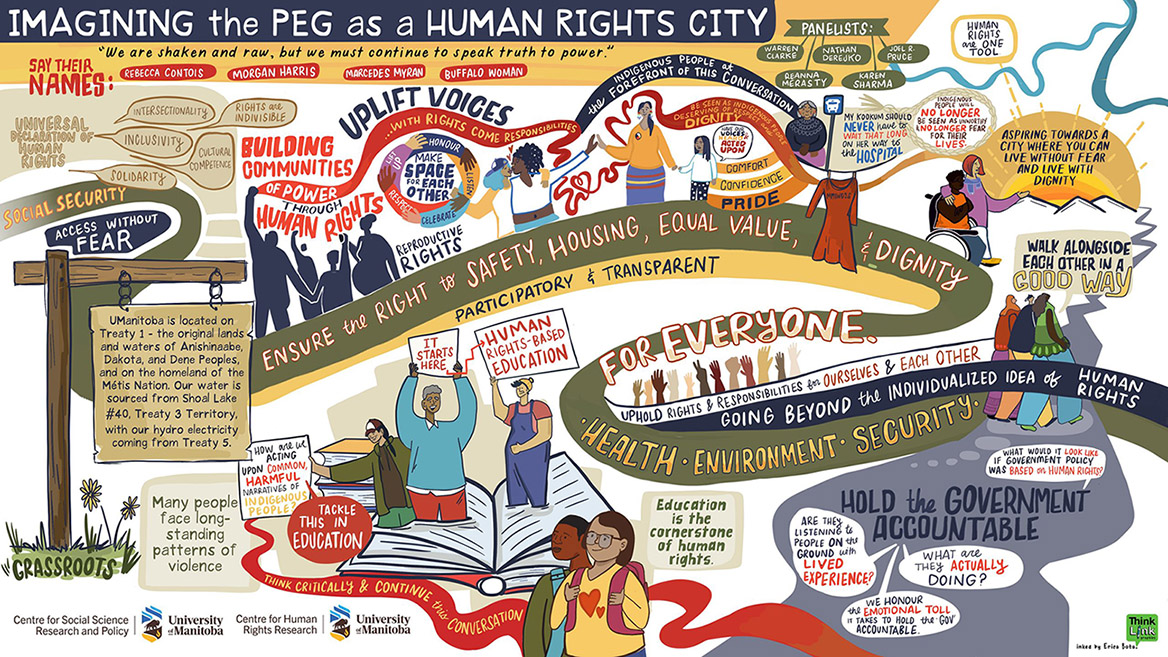
Human Rights Day is celebrated by the international community every year on 10 December. It commemorates the day in 1948 that the United Nations General Assembly adopted the Universal Declaration of Human Rights.In recognition of Human Rights Day, the CHRR alongside the Centre for Social Science Research and Policy at the University of Manitoba will host a virtual conversation entitled ‘Imagining the ‘Peg as a Human Rights City.’

Imagining the Peg as a Human Rights City
December 9, 2022
Dr. Warren Clarke, Dr. Nathan Derejko, Reanna Merasty, Dr. Joel R. Pruce, Karen Sharma
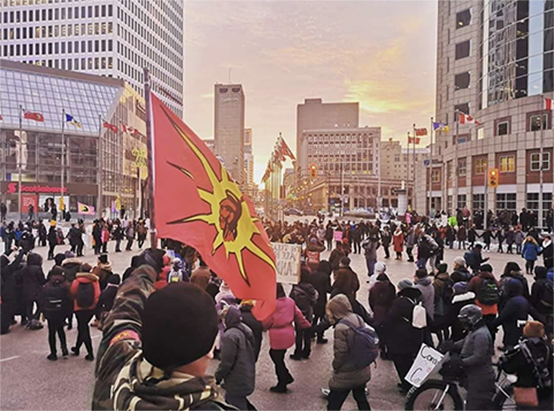
Human Rights Day is celebrated by the international community every year on 10 December. It commemorates the day in 1948 that the United Nations General Assembly adopted the Universal Declaration of Human Rights.In recognition of Human Rights Day, the CHRR alongside the Centre for Social Science Research and Policy at the University of Manitoba will host a virtual conversation entitled ‘Imagining the ‘Peg as a Human Rights City.’

Contact Us
We’d love to hear from you.
442 Robson Hall
University of Manitoba
Winnipeg, Manitoba
R3T 2N2 Canada
204-474-6453
Quick Links
Subscribe to our mailing list for periodic updates from the Centre for Human Rights Research, including human rights events listings and employment opportunities (Manitoba based and virtual).
Traditional Territories Acknowledgement
The University of Manitoba campuses are located on the original lands of the Anishinaabeg, Ininiwak, Anisininewuk, Dakota Oyate, Dene and Inuit, and on the National Homeland of the Red River Métis.
Centre for Human Rights Research 2023© · Privacy Policy

